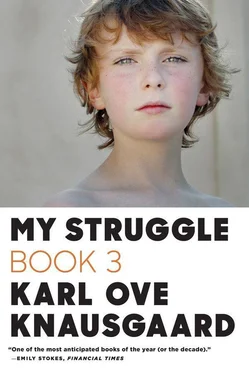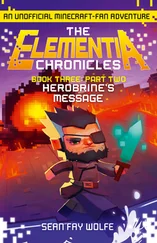As the drone of the car faded down the hill, I opened the door and went into the living room. Draped myself over the brown leather chair and put my feet on the table. Got up, went into the kitchen, opened the fridge, and looked inside: two plates of sandwiches, ready-made, that was our supper. Opened the cupboard next to it, took out the box of raisins, filled my hand, and tossed them into my mouth with one hand while flattening the level of the raisins in the box with the other. Munching, I walked into the living room and switched on the TV. At half past six there was a repeat of Blindpassasjer. It was a series about a spaceship, unbelievably scary, broadcast on Friday night, and we weren’t allowed to watch, but neither Mom nor Dad knew anything about the repeats, which, to our great good fortune, were on when they weren’t here.
Yngve came in and reclined on the sofa.
“What are you eating?” he said.
“Raisins,” I said.
“I want some, too,” he said.
“Don’t take too many,” I said as he got up, “or Dad’ll notice.”
“All right,” Yngve said. He opened the cupboard door.
“Do you want some almonds as well?” he called.
“Yes, please,” I said. “But not many.”
The street lamp outside shone orange in the darkness. The tarmac beneath glistened the same color. And some of the spruce tree behind it. But the forest behind that was as dark as the grave. From the steepest part of the hill came the whine of a moped.
“There you go,” Yngve said, releasing some almonds into my palm. I could clearly recognize his odor. It was acrid yet faint, almost metallic. Not his sweat, that smelled different, but his skin. It smelled of metal. When we wrestled I could smell it, when he tickled me I could smell it, and sometimes when he was lying down and reading, for example, I could put my nose to his arm and breathe in the smell. I loved him, I loved Yngve.
Five minutes before Blindpassasjer started, Yngve got up.
“Let’s lock the front door,” he said. “And then let’s switch off all the lights to make it scary.”
“No!” I said. “Don’t do that!”
Yngve laughed.
“Are you scared already?”
I got up and stood in his way. He fastened his arms around me, lifted me up, and sat me back down and continued toward the stairs.
“Don’t!” I said. “Please!”
He laughed again.
“I’m going downstairs now to lock the door,” he said from the stairs.
I ran after him.
“I mean it, Yngve,” I said.
“I know you do,” he said. Locked the door and stood by it. “But I’m in charge when we’re on our own.”
He switched off the light.
In the murk, illuminated only by the light from the adjacent room, there was something satanic about his smile. I ran upstairs and sat in the chair. Listened to him switching off light after light. The hall, the lamp over the living-room table, the ceiling lamp in the kitchen. Then the four small wall lamps above the sofa and, finally, the lamp on top of the television. Apart from the faint shimmer from the outside lamp and the blue flickering glow from the screen it was completely dark when the episode began. It was scary right from the opening scene, a man was standing and swinging a scythe somewhere, and then he turned, and his face wasn’t a face but a mask. I felt a tingle at the very tips of my fingers and toes and my innards were taut with fear. But I watched, I had to watch. When it was over, half an hour later, Yngve got up behind me.
“Don’t say anything,” I pleaded. “Don’t do anything!”
“Do you know what, Karl Ove?” he said.
“Oh, no!” I said.
“I’m not who you think I am,” he said, coming toward me.
“Yes, you are!” I said.
“I’m not Yngve,” he said. “I am another.”
“No, you’re not!” I said. “You’re Yngve! Tell me you’re Yngve.”
“I’m a cyborg,” he said. “And this …” He stretched out his hand and lifted his sweater. “This is not flesh and blood. This is metal and cables. It looks like flesh and blood, but it isn’t. I am not a human being.”
“Yes, you are!” I said, starting to cry. “You are Yngve! Yngve! Say you’re Yngve!”
“Now you will come down to the cellar with me,” he said. “Heh heh heh …”
“YNGVE!” I screamed.
He smiled at me.
“I’m only joking,” he said. “You didn’t seriously think I was a cyborg, did you?”
“Don’t do that,” I said. “Switch the light on right now.”
He took a step toward me.
“NO!” I shouted.
“OK, OK,” he laughed. “Let’s switch on the light then. Shall we eat now or what? Are you hungry?”
“Switch on the light first,” I said.
He switched on the wall lights and the lamp on the TV, where the news had already started. Then we went into the kitchen and had our supper. Yngve made us some tea, which was fine as long as we made sure to clear up after us, it must have been inconceivable for Dad that we could actually use the stove and boil water when he wasn’t here. Afterward we unpacked our soccer game on the living-room table, with the door to his room open and my favorite Queen record — A Night at the Opera — playing.
When we heard Dad’s car outside we hurriedly cleared the table and went into our separate rooms. Sometimes he summoned Yngve if we had been alone and asked what we had been doing and how it had been, but this evening he walked straight into the living room and sat down in front of the television.
It was actually a relief that he kept his distance the way he did, but there was more to it than that, I had a sense he didn’t want things to be like this, it was as though the air in the house was weighed down with this feeling, a demand no one could fulfill.
When he came up to us next time it was dreadful. I had been under the weather, I had a cold and a temperature that had risen dramatically in the last hour, and I was sitting in Yngve’s bed, leaning against the wall and reading one of his magazines. He was doing his homework at the desk, and the Boomtown Rats were playing on the turntable.
Bang, the door opened, and there was Dad looking at us.
He was in a good mood, his eyes beaming with energy.
“You’re playing music,” he said. “It sounds good. What’s their name?”
“The Boomtown Rats,” Yngve said.
Dad translated the name into Norwegian. “Do you remember how you laughed when I said Crystal Palace was Krystallpalasset? You didn’t believe me!”
He smiled and came into the room.
“Do you like the music, too, Karl Ove?” he said.
I nodded.
“Come on. Let’s dance,” he said.
“I’m sick, Dad. I think I’ve got a temperature. I don’t feel like it.”
“Course you do,” Dad said, grabbing my hands, dragging me to my feet, and swinging me round.
“Stop it, Dad!” I said. “I’m sick! I don’t want to dance!”
But he carried on, swung me round, faster and faster, wilder and wilder. It was unbearable and I was on the point of throwing up.
“PACK IT IN, DAD!” I shouted in the end. “PACK IT IN!”
He stopped as quickly as he had started, threw me down on the bed, and left.
Every Friday Mom came home, I would always be close at hand so that I could be with her first because if I was first Dad couldn’t send me to my room, which he could do if they were sitting and talking. By the time she left again on Sunday night or Monday morning it was as if Dad had come closer to us, or at least me, for again he called me to the kitchen to tell him what had happened during the day while he cooked. We ate in silence and after doing the dishes he disappeared down to his study without fail. Occasionally he came to watch TV with us, but usually he was downstairs until supper, and so it was as if Yngve and I were on our own at home. Not that I spent my time much differently from how I would have done if he hadn’t been there. Mostly I lay on my bed reading. As Mom no longer drove us regularly to the library, and I had read all the books in the school library, I started on Mom and Dad’s shelves. I read Agatha Christie and I read Stendhal, Le Rouge et Le Noir, I read a book of French short stories, I read a book by Jon Michelet and a biography of Tolstoy. I started writing a book myself, it was going to be about a sailing ship, but after I had written the first ten pages, which consisted largely of listing all the people on board, what kinds of provisions they had, and what cargo they were carrying, Yngve said no one wrote books about sailing ships nowadays, they did when sailing ships existed, now people write about what it’s like to be alive today, and so I stopped. I also compiled a newspaper that autumn, in triplicate, which I put in three mailboxes, one for Karlsen, one for Gustavsen, and one for Prestbakmo, but I never heard any more, they just seemed to disappear into a void, as if they had never existed.
Читать дальше












